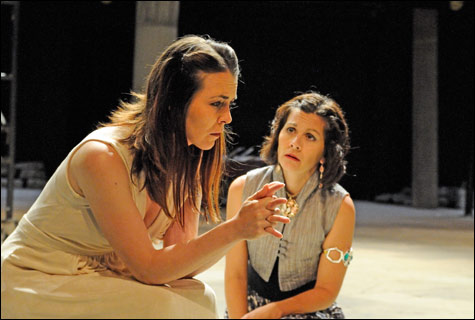
THE DREAMS OF ANTIGONE: Did Sophocles really need to be improved? |
It would seem that Sophocles has been hanging around for 2500 years waiting to be improved — and the makeover artists have been numerous. Antigone alone has been given a new look by Jean Anouilh, Bertolt Brecht, Seamus Heaney, A.R Gurney, and Judith Malina, to name a few. Now Trinity Repertory Company’s artistic director, Curt Columbus, gets in on the act with The Dreams of Antigone, an Upstairs, Downstairs update of the tale of Oedipus’s martyred daughter that’s in its world premiere on the company’s home turf (through October 26). It’s easy to understand the motivation: the formality of Greek tragedy can be intimidating, and the device of the Chorus, as it chants its cautionary if sympathetic strophes and antistrophes, is hard to handle. But why not leave well enough — and Sophocles did well enough — alone?
Columbus’s rewrite, undertaken in collaboration with the Trinity acting company, weaves ancient Greece and contemporary America into a script that begins “We the people” before segueing from the US Constitution to Sophocles’s story of heroic defiance in the face of unbending governmental authority. The piece is intended to resonate with a crowd for whom the role of fate and the will of the gods have less pull than they did with the original audience and to examine the roles of myth, the populace, and even theater itself in determining the course of public events. It asks why Antigone’s story has so stubbornly endured and whether there is a point at which it might have gone in another direction.
You remember the basics: Oedipus’s sons, Eteocles and Polyneices, fought a brutal civil war over control of Thebes, at the culmination of which they killed each other. Their uncle, Creon, seeking to restore order and establish his own authority, has declared Eteocles a hero and Polyneices a traitor who deserves to rot where he fell. The new honcho issues an edict — which Antigone disobeys — that anyone who tries to bury him will be executed. In the Greek play, Antigone places her allegiance to a Higher Authority ahead of her allegiance to the State; here it pretty much comes down to “doing the right thing.” And too much of the script has that sort of blunt, simplistic ring — as if it were the result of intense improvisation rather than authorial intent. Columbus’s audaciously Americanized adaptation of The Cherry Orchard brimmed with colloquial vigor; this one, with its shared narration and political speechifying interspersed with family squabbling, ricochets between the obvious and the jarring — as when dead relatives appear in dreams, calling snide attention to their incestuously twisted family tree or, in the case of the brothers, re-enacting the battle for Thebes as a joust played out on high, movable scaffolds. Hey, this is Antigone, not American Gladiators.